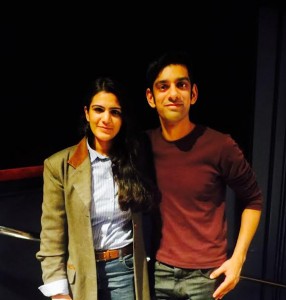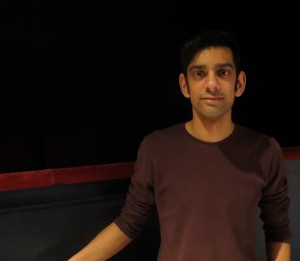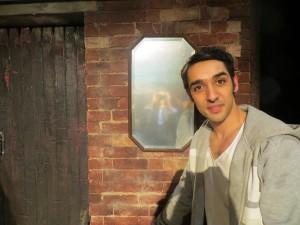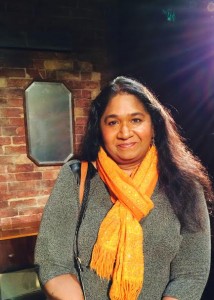 A universal story of standing up for yourself, the (dys) functionality of family and the question of identity, East is East is a must see production.
A universal story of standing up for yourself, the (dys) functionality of family and the question of identity, East is East is a must see production.
BollySpice had the chance to plunge in deeper and get to know the issues provoked – even more closely.
A conversation with three East is East cast members resulted in an interview exploring multitude avenues.
Speaking exclusively to Amit Shah, Ashley Kumar and Rani Moorthy, we heavily explored identity, what finding oneself entails, the strengths and weaknesses of being human, the history of Bollywood, women’s power, suppression and even Shah Rukh Khan!
East is East is currently being performed at Trafalgar Studios, London.
SIBLING LOVE. IDENTITY. BEING HUMAN
In conversation with Amit Shah, AKA Abdul
Shah’s credits include Salim in theatre production “Bombay Dreams” and Mansur in “The Hundred Foot Journey” and awards include the Ian Charleson Commendation for The Alchemist at the National Theatre
Aashi Gahlot: What did you find challenging about playing the role of Abdul?
Amit Shah: Well the most challenging aspect is probably that Abdul disappears for most of the first act. He comes in and he discovers that his marriage is going to be arranged and then he goes into isolation. So you kind of drop out of the play for a bit and then come back in the second half – and really go on a huge journey. And I think that what was most important for me was mapping out his journey because I think he is the character who goes on the biggest journey throughout the whole show. At the end he almost takes George’s power and really takes control of the whole situation. So he really goes on that big arc.
AG: What does identity and belonging means?
AS: It means who you are. We are all unique human beings and we all have a different make up, different genes. We come from different places. We have different experiences. And it’s always difficult to kind of group different individuals – unique individuals – together, because we are so unique and different. We all have our own specific identity and belonging.
Even within a family, a brother and sister would have a different identity – so it is very important to who you are as a human being I think.
 AG: What I found touching was how you reached out to Sajit. That was beautiful.
AG: What I found touching was how you reached out to Sajit. That was beautiful.
AS: Yes. That’s a very special relationship between Abdul and Sajit because Abdul at home is the eldest and Sajit is the youngest. I think Abdul is the only one who gives Sajit space and time to talk. He is very patient with him whereas everyone else just dismisses him or shouts at him or beats him up. And Abdul has a very different tactic with Sajit. I think he probably sees a bit of Sajit in himself you know. That line where I say: I wish I had a parka! He feels exactly the same emotions that Sajit does at that time. He wants to hide away and just run away and not face the truth.
AG: What would you say are Abdul’s strengths? Was there any moment whilst playing his part that you thought to yourself – oh come on Abdul! Sort it out!?
AS: No. He’s very human and very real. And that’s credit to Ayub the writer. The way he has written these characters, they are all very real characters. I think Abdul is a beautiful character because he goes on this huge journey – he really finds himself and the strength to take control of the situation, to put a stop to the way this family are in decline. They are all breaking up and the whole family is disintegrating in a way and then he’s the one trying to pull things together and really hold it together.
AG: Something going through my mind at the end of both the film and the play was the question: How does it end for this family? Is that even possible to answer? Life is always a work in progress…
AS: It is kind of a slice of this family’s life. You don’t really get a sense that there is an end to this story. It’s going to continue. Which is so beautiful. I felt the exact same thing when I watched the film. The family still has problems at the end and there are still issues to be resolved. But there’s a new path now, a new avenue which they can now go down. So there’s not a kind of happy ending that you might get in a Disney or Bollywood film. They don’t tie up all the knots. It’s just kind of left up in the air which is the beauty of this story. I think it reflects real life really. We don’t live our life having a bad start in the morning and then in the evening everything gets resolved. We just have to keep going and continue. That’s what I think happens in this play and in the film.
AG: Who was your favourite character when you first watched this film?
AS: George. I guess I knew he was harsh towards his family. But the way Om Puri played it in the film, he was so charming. I’m a great admirer of comic timing and he’s a great actor who I always have looked up to. I was very fortunate to work with him and play his son in The Hundred Foot Journey. So that was one part that I really, really loved.
FINDING YOURSELF. UNDERSTANDING PARENTS. FACING FEARS
 In conversation with Ashley Kumar, AKA Tariq
In conversation with Ashley Kumar, AKA Tariq
Kumar’s credits include EastEnders, Spooks, Doctors and The Bill.
AG: Name 3 strengths your character Tariq holds:
Ashley Kumar: Passion. Fire. And loyalty – which is something you wouldn’t expect from Tariq but I think it’s there.
AG: Now 3 weaknesses:
AK: I think he’s quite immature. I think he’s quite blinkered. I don’t think he sees the big picture necessarily until the end. And impulsive. That’s the main one. He is very, very impulsive.
AG: What’s your advice to all out there who are trying to stand up to their family and trying to be seen as individuals?
Do you know what? I am still trying to figure that one out in my own life!
I think the main thing is to accept that your parents have their own limitations. They’re not perfect. Nobody is. They are probably trying to do their best on what they had. They are trying to just improve on the upbringing they had. They are human beings just like you and I are.
Find out who you are! Figure out who you are independent of your parents.
AG: How do you find who you are?
AK: For me it started when I found acting. It was like my thing that kind of became mine. I owned it. No one else could take it away from me. No one else in my family did it. It was mine. So I kind of threw myself into that.
But I guess – wow this is getting deep! We all try and find out who we are all the time-
AG: It changes as well over time-
AK: Yeah with age! Every sort of 4 or 5 years you change. Things that used to be important to you are not so much anymore and then new things become priorities. You look at things differently. We understand ourselves, our friends, our family differently. You know we are always trying to figure our stuff out I guess in life. Sometimes you get close. And sometimes you don’t.
AG: East is East is set in the ‘70’s. Would you say that the “family” has changed?
AK: Essentially I think the family unit throughout time has stayed the same in one sense but I mean obviously it’s a very different environment now to when Tariq and the kids and George were living then. In terms of the prejudice, in terms of the culture, in terms of you know, what was open to them career wise, socially – you know there were a lot of closed doors. I think nowadays it’s a much more multi cultural and open society.
In terms of the basic family unit I think predominantly there’s been the same idea you know? But I mean obviously these days there’s a lot more divorces and stuff like that. But I think ultimately kids look up to their parents and then grow up and figure other stuff out.
AG: I felt George was the most frightened character of all. He is frightened of losing his kids. Frightened that he has failed and let down his community. He is frightened of not fitting in.
So, what scared you about George whilst playing his son in this play?
AK: In the shoes of Tariq – it’s interesting because you very rarely see George and Tariq in the same room . I think that’s very cleverly written because I think Tariq is quite a fiery character. And the resentment is so strong towards his father. Tariq really resents him. He feels like everything that has gone wrong in his life is George’s fault – it’s not his own. That’s right to some degree but not completely. So I think Tariq is afraid of George probably physically, like most of them are. It’s also of interest that in the play as opposed to the film, in the end Tariq doesn’t leave the house. So, there’s something there as well.
What scares me about George is that it’s so familiar. I’m mixed race. You know – it’s so familiar. I think that’s the beauty of Ayub’s writing and that’s why East is East has stood the test of time because obviously Asian people can relate to it, but I think all people can relate to it.
DYSFUNCTIONAL FAMILIES. HISTORY OF BOLLYWOOD. SRK. WOMEN POWER
 In conversation with Rani Moorthy, AKA Mrs Shah.
In conversation with Rani Moorthy, AKA Mrs Shah.
Moorthy is a playwright and artistic director of Rasa Productions. Her credits in theatre include Rafta Rafta, If only Shahrukh Khan; television credits include Emmerdale, Citizen Khan; Film credits include All in Good Time and Twenty8K.
AG: What is your favourite aspect of East is East?
Rani Moorthy: My favourite aspect of East is East is the fact that it is about a dysfunctional family but in a way it allows us access into it and you know, dysfunction is a continuum. And it depends on whether you are at the extreme end or which part of it. It’s like a thread and we are all beads in that thread. I think that’s what it is. It helps you engage at whatever level you are. You may not have had any abuse in your family but you know, it’s the level and the degree in which you experience it.
And it’s an eternal question. Family is an eternal problem. You learn your values from your family; it stays with you all your life. So it’s a very profound aspect of the play that I find interesting and exciting.
AG: Please tell us about your play inspired by the King of Bollywood, Shah Rukh Khan:
RM: The play is called “If Only Shah Rukh Khan” – meaning if only Shah Rukh Khan appeared and saved me from my life, which is basically what the play is about. I think that he kind of embodies all the things that we project onto him. We project onto Shah Rukh Khan all the heroic qualities that we miss out on real life. We project onto him the sense of somebody who can save us. He is a “new age” man. He is so human. He is funny. He is a boy. He is a man. He is incredibly kind I think – he’s got a kindness to him in every character he portrays seems to have – behind the eyes he has a kindness. I’m looking forward to seeing him playing older roles like Om Puri – the masculine in terms of a paternal masculine.
AG: Bollywood is an important art form that can almost “teach” and be a reference point of emotions – especially within a South Asian society where there is suppression-
RM: I think so. I think that’s why we project all our sexuality and our sexual longing onto people like Shah Rukh and Aishwariya Rai – the list goes on and on and on! Because I think that the society is quite repressed and also the fact of you know, if you think of a lot of Bollywood films are like Hindu epics, Indian mythology; you think of demi-gods, then you think that these people actually sit very comfortably in those roles. You can almost imagine the Ramayana, being modern day versions of those and they are kind of avatars of demi-gods that we revere. And so when you project onto them those qualities that uplift, take you out of yourself. I know that people are kind of bendy about this term “escapism” to do with Bollywood, but actually the best Bollywood films are really quite, they hit upon real issues you know. And even though they skirt around it and maybe make it a kind of song and dance because that has to be – in a way the song and dance came about because of nationalism because it was a way of uniting the country.
I wrote a play about the history of Bharatnatyam. A lot of the Devadasi’s, the temple dancers in the South, became Bollywood actresses or Tollywood actresses because there was nowhere for them to go. Actresses of that era became cinema icons because they had patronage from the Maharajas and that ended –so they all ended up in cinema. So it’s a very, very interesting history if you think about it.
AG: So much history is hidden, just waiting to be –
That’s what I do in my company called Rasa. I believe in the culture of links- that we are all linked. But it’s up to us to excavate some of those memories because the thing is that it’s either hidden by oppression, patriarchy, political conditions, ethnic conflict. What’s happening in Sri Lanka – I’m Sri Lankan Tamil – and what’s happening now is this suppression of a lot of the Tamil values and Tamil culture. They won’t say that openly but that’s what is happening… So it’s just absolutely interesting how we as South Asians, part of our cultural make up is that we have to understand what is being suppressed.
If you think of temple dancers – if you go to a Hindu temple for example, or even if you talk about naach in the Muslim culture in terms of the nauch dancers from the Muslim tradition, it is a kind of ability of these women to project their own sexuality – something quite liberating about it through the centuries which people found very dangerous and therefore the need to suppress.








